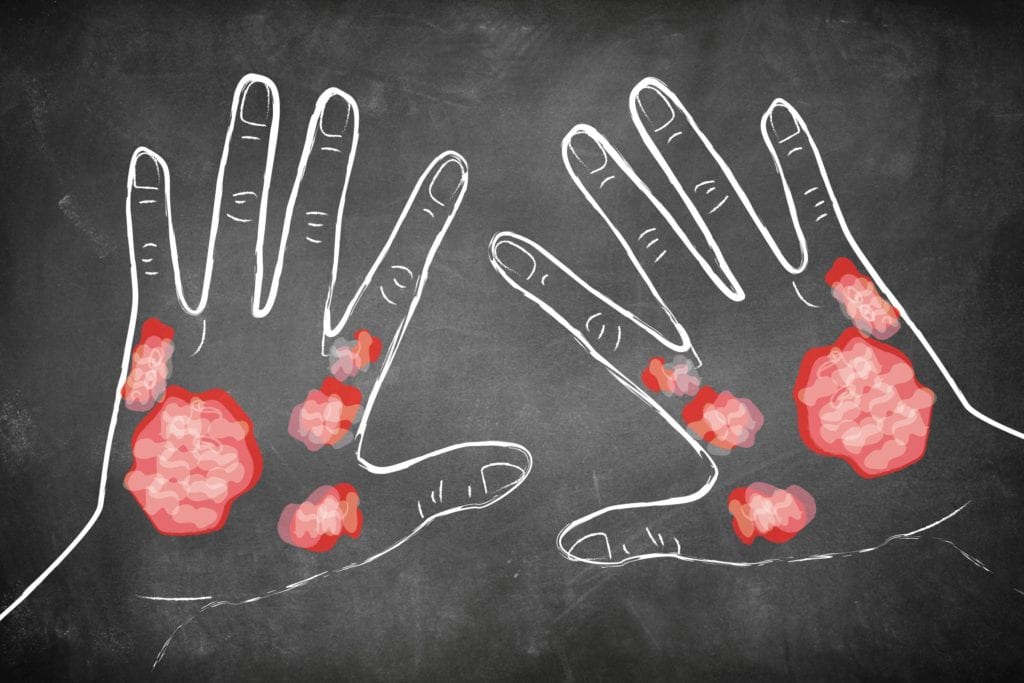

1. Psoriasis is related to immune system problems
Normally, the white blood cells in your body are your protector, helping to fight off infections and heal wounds. “Your body reacts to something — often an infection such as strep throat or something else — that causes your immune system to switch to making more messengers/proteins,” says Sandra Johnson, MD, FAAD, a board-certified dermatologist in Fort Smith, Arkansas. But with psoriasis, those white blood cell messengers start attacking your healthy cells too. This causes new skin cells to rush to the surface faster than usual, which creates those silvery red patches and other psoriasis symptoms. The underlying inflammation from an overactive immune system might affect other parts of your body too.
2. Psoriasis can run in families
Genetics seem to be one of the biggest risk factors for developing psoriasis. If one or both of your parents had it, your likelihood of being diagnosed increases too.
3. Psoriasis is a chronic condition
At this point, there’s no way to cure psoriasis, but there are many different treatment options that can help manage it. The sooner you can talk to a dermatologist about your psoriasis symptoms, the better, says Anthony Rossi, MD, FAAD, board-certified dermatologic surgeon at Memorial Sloan Kettering Cancer Center and assistant professor of dermatology at Weill Cornell Medical College. “It’s about getting psoriasis under control and sort of nipping it in the bud,” he says.
4. It isn’t contagious
No need for anyone to keep their distance — psoriasis isn’t contagious, so there’s no reason to avoid touching another person’s psoriasis patches. It’s common for people with moderate to severe psoriasis feel stigmatized by their skin. They may avoid activities that require their skin to show, such as going to the beach or swimming. Psoriasis can have a significant emotional toll on people; depression is common (more on this below). So it’s important to dispel the idea that psoriasis plaques are contagious or that people having a psoriasis flare should be avoided.
5. Psoriasis doesn’t always look how you’d expect
People tend to be familiar with the red, silvery, scaly patches typical of the most common form (plaque psoriasis), but psoriasis can take other forms too. Pustular psoriasis is marked by pustules all over the body, while nail and scalp psoriasis are sometimes limited to a certain body part. Unlike other forms of psoriasis, guttate psoriasis appears as tiny bumps and might not be chronic. It usually crops up when a person has a seemingly unrelated infection, such as strep throat, and it might disappear when the body fights off that bug.
6. You might get a flare-up when you’re sick
When your body is fighting an infection like a cold, your immune system is working harder than usual. While your body ramps up to fight the virus or bacteria, it’s also increasing the white blood cells that tend to target your healthy cells, and you could end up with a psoriasis flare on top of your illness.
7. Your nails might show symptoms too
Outer psoriasis symptoms can involve the nails. “You get these oil-drop lesions on the nail, and it’s like a translucent red or yellow discoloration,” says Dr. Rossi. The nails can also become pitted or the nail plate can start lifting up; if debris or crusting gets underneath, the condition can become painful.
8. Psoriasis can also affect your joints
Up to 30 percent of people with psoriasis will get a type of arthritis called psoriatic arthritis, which is triggered by the same inflammatory responses that create patches on the skin. “Osteoarthritis is usually due to overuse and cartilage breakdown,” says Dr. Johnson. “Psoriatic arthritis is caused by inflammation, so there is usually more swelling.” If joint pain accompanies psoriasis, it’s important to use a medication regimen that targets underlying inflammation rather than just topical creams. You should see a rheumatologist in addition to a dermatologist.
9. Depression is common
Psoriasis patients have an increased risk of depression, though doctors aren’t sure if it’s driven by embarrassment and frustration over their appearance, or if it’s could be related to the underlying inflammation, or both. “Psoriasis is such a visible disease, and it’s not easy to cover up,” says Dr. Rossi. But there’s hope: Most people report that their depression symptoms improve after psoriasis treatment, and other mental health treatment like therapy can help too.
10. Stress reduction is a key part of psoriasis treatment
In addition to topical creams or disease-modifying medications, stress-relieving activities are important in preventing psoriasis flares. “There is some link with stress flaring of these inflammatory conditions,” says Dr. Rossi. Stress-reduction techniques like meditation or exercise probably won’t clear your psoriasis symptoms up completely, but they may keep them from getting any worse.
11. Dermatologists’ treatments are more effective than DIY ones
While there’s plenty of valuable information on the internet about psoriasis and how to heal it, Dr. Rossi recommends visiting a board-certified dermatologist before starting any at-home treatments. “Seeing a dermatologist can really change the outlook,” he says. “You get treated early and to a clear point faster than going through all the trial and error [of DIY treatments].”





